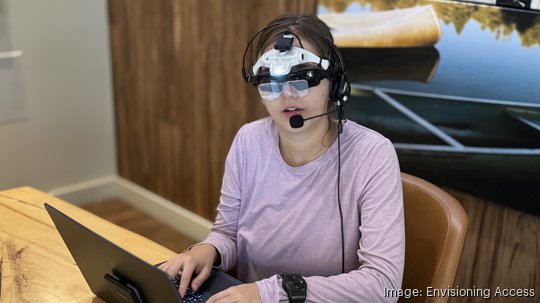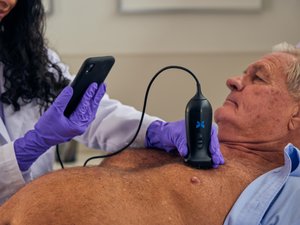
Boston nonprofit Envisioning Access is working with startups and universities to develop assistive technologies that enable adults with disabilities to gain independence—and that can replace monkeys as service animals.
Creating opportunities for independence has always been the mission of the organization, but its use of technology is new. Until 2020, Envisioning Access was Helping Hands: Monkey Helpers, and its focus was on training capuchin monkeys to provide mobility assistance to individuals with physical disabilities, mainly caused by spinal cord injuries.
The nonprofit, which launched in 1979, had trained and placed 300 monkeys to do tasks like helping the people they were paired with do things like turn the pages of a book, turn on and off lights, use remote controls, and other fine-motor skill-requiring chores.
Using monkeys as service animals is a thing of the past, however, and Envisioning Access had to figure out how to move into the future, its executive director, Diane Nahabedian, said.
The focus now is on developing new technologies that increase accessibility.
“What makes sense are innovative technologies to get people back to work, back to school, and out of isolation,” she said.
Its Innovative Technology Initiative currently includes four pilot projects using artificial intelligence, smart robotics, and machine learning to benefit individuals with disabilities.
The four projects support novel technologies that reduce limitations of different physical disabilities, from vision impairment, neurological disease, and paralysis.
The nonprofit set out to find startups and university institutes across the country that would be interested in partnering to develop assistive technologies, with active input from the adults that would be using them.
On one project, Envisioning Access’s last client to have a capuchin monkey is helping redevelop virtual reality games so individuals with physical disabilities can use them. Called the Billy Project, Envisioning Access found a developer to create augmented tools that make the games more accessible.
The other three projects are partnerships with startup Cognimate, a developer of an AI-powered glove to help stroke victims recover, Access AI, an app being developed at Northeastern University to help those who are blind apply for jobs, and Waipoint, a tech startup out of Washington that is making glasses that tell visually impaired people what’s in front of them.
A problem in the adaptive technology industry, Nahabedian said, is that often individuals with disabilities are not able to use the devices and programs developed with them in mind because they require intervention from others, and don’t help people become more functionally independent.
The nonprofit envisioned its future as teaming up with tech startups and universities, and enabling them to create innovations that are useful.
“We said: We will work with them to make sure the technology is appropriate, and that's what we’re doing,” Nahabedian said.
But don't worry about the monkeys, which are no longer recognized as service animals. The Allston training center has been converted to a retirement home for the monkeys.
Sign up for The Beat, BostInno’s free daily innovation newsletter from BostInno reporter Isabel Tehan. See past examples here.








